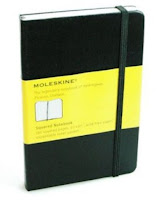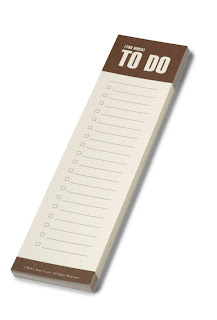 WHERE TO START
WHERE TO STARTSTEP 1: GET A SMALL NOTEBOOK - something about 4 x 6 inches, 40-60 pages is perfect. This notebook is now your best friend and goes everywhere with you. You may even want to give it a name. It will be your constant companion. If you use it right, it may be even more important than a wallet or purse. If you can find a notebook that holds a pen, you will be very happy that you did.
Note: You are free to try using a smart phone or device in place of a notebook, but as a rather geeky person myself, I still find the notebook has advantages (like drawing pictures) that my iPod touch can't handles quite as well.
 STEP 2: DIVIDE THE NOTEBOOK INTO 5 SECTIONS
STEP 2: DIVIDE THE NOTEBOOK INTO 5 SECTIONSUse pieces of masking tape to mark off each section.
Section 1 - To Do
This section should have about 3 times as many pages as any other section. Every time you think of something you need to do, write it here. This will be your most frequently used section.
Section 2 - Ideas
Any random thoughts such as "fluorescent bulbs" or "bug collection" should go here. There are no bad ideas, this section frees your mind to have wild imaginings without your inner realist shooting them down.
Section 3 - Lists
My lists section has lists of songs I'd like to buy, movies I want to watch, foods I could try cooking, my shopping list, people I'd like to interview, websites I've been told to visit, Books I want to read, etc. I love section 3 because it always has answers to my personal "Jeopardy" questions such as "Someone last Thursday told me I have to see movie Z." I look at my movies list... there it is!
 |
Anything that takes multiple steps to accomplish is a goal. Examples include "Run a 10k, save $20,000 for a down payment on a house, visit all 50 states, become a black belt in karate, etc." Some people call this a bucket list because they want to do these things before they "kick the bucket."
Section 5 - Notes
You will always have stuff that doesn't quite fit in any of the other 4 sections, but that you want to remember. Use this section for quotes you like, doing some quick math, or just to look busy writing something to avoid awkward social situations.
Tomorrow I will write more about how to use your notebook to save
If you liked this post, share it on Facebook!








